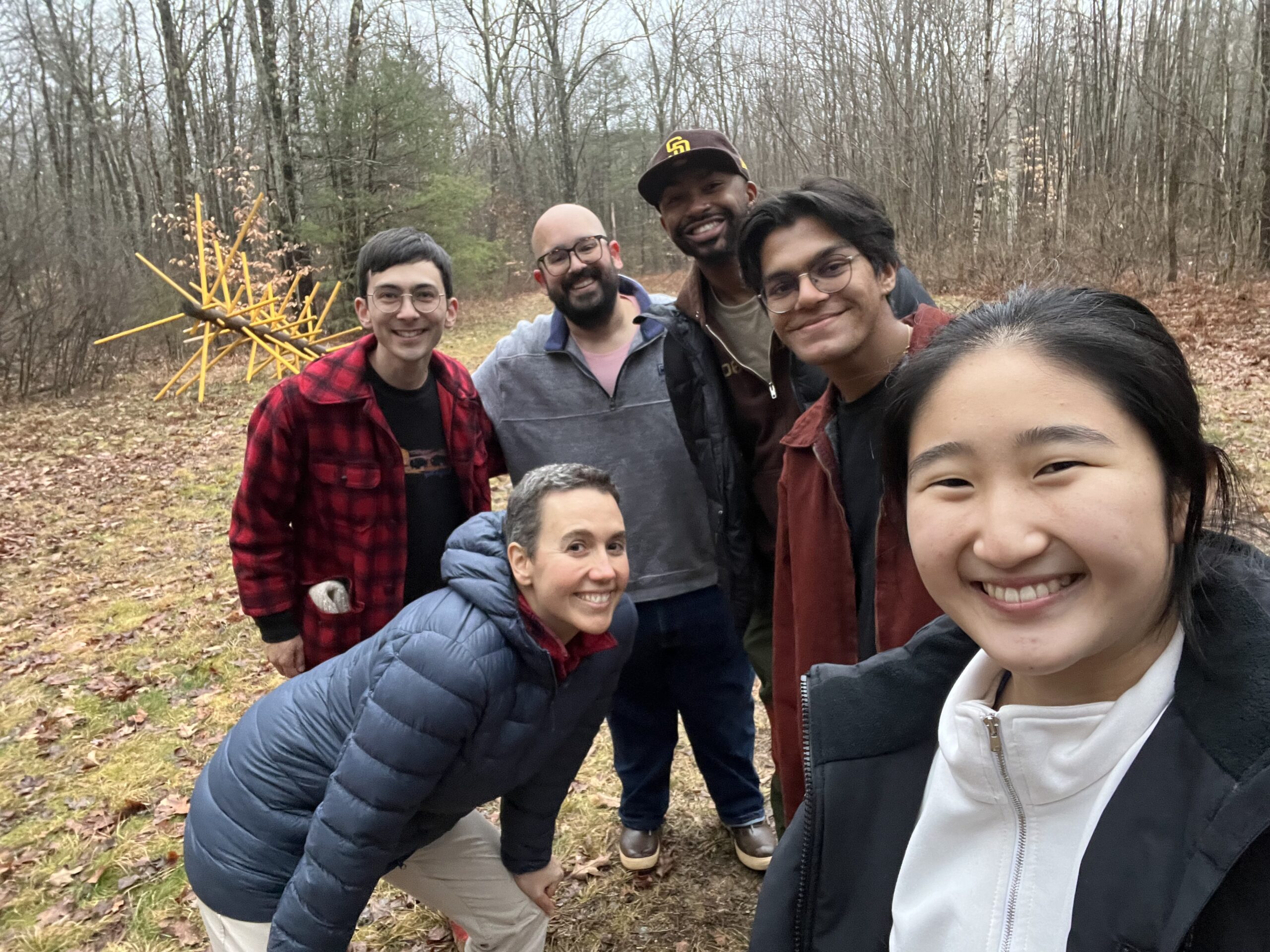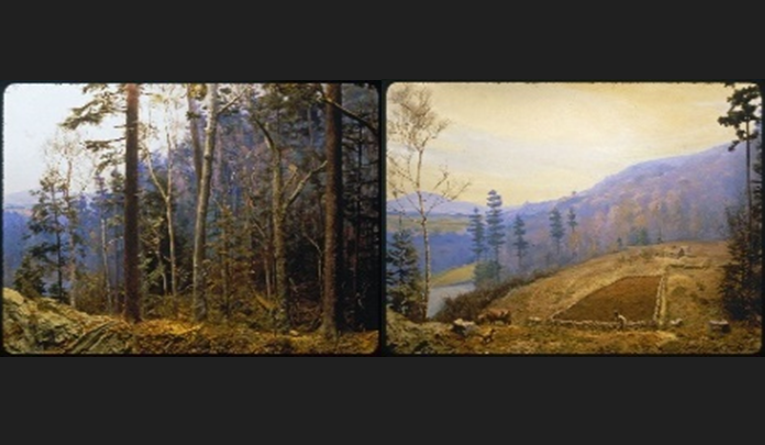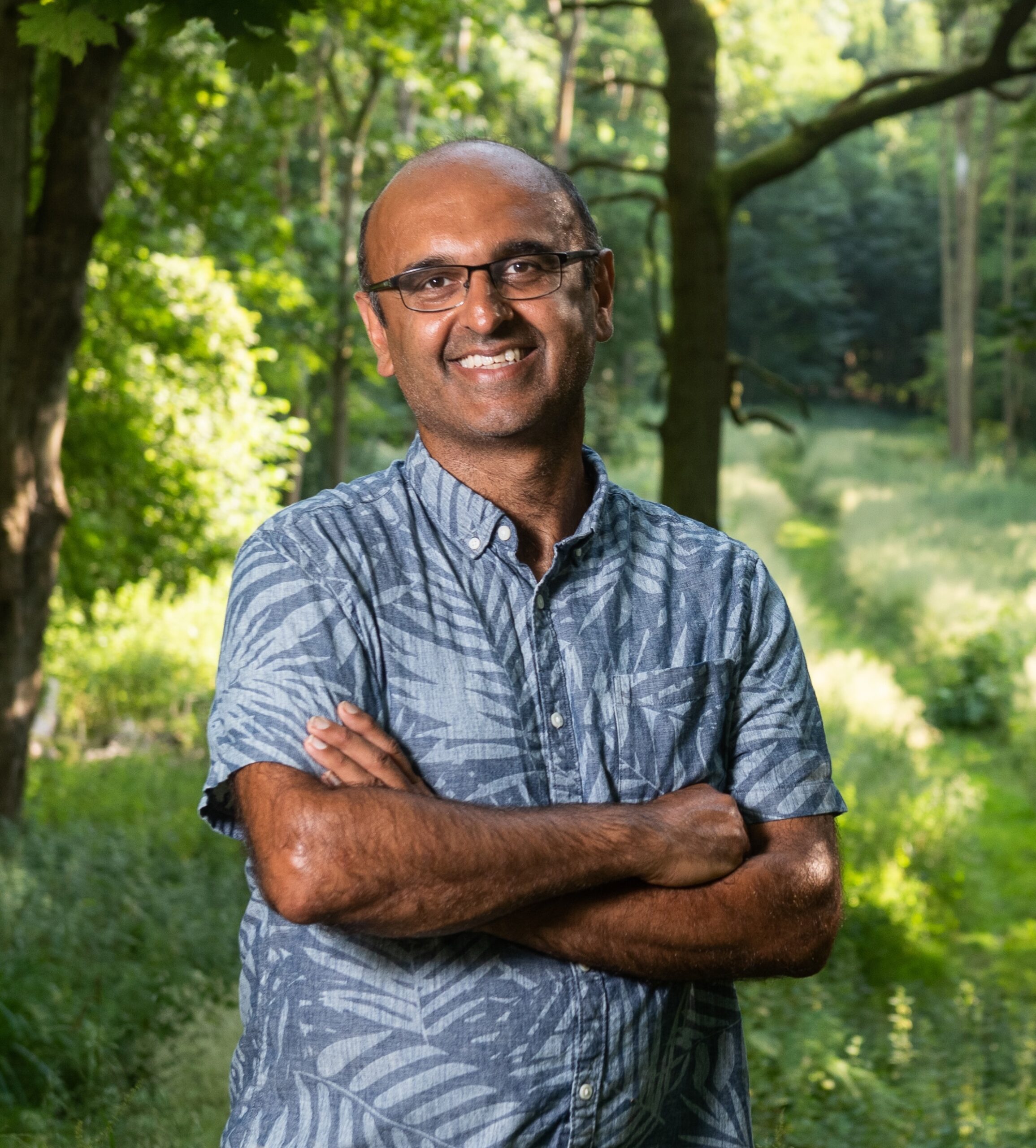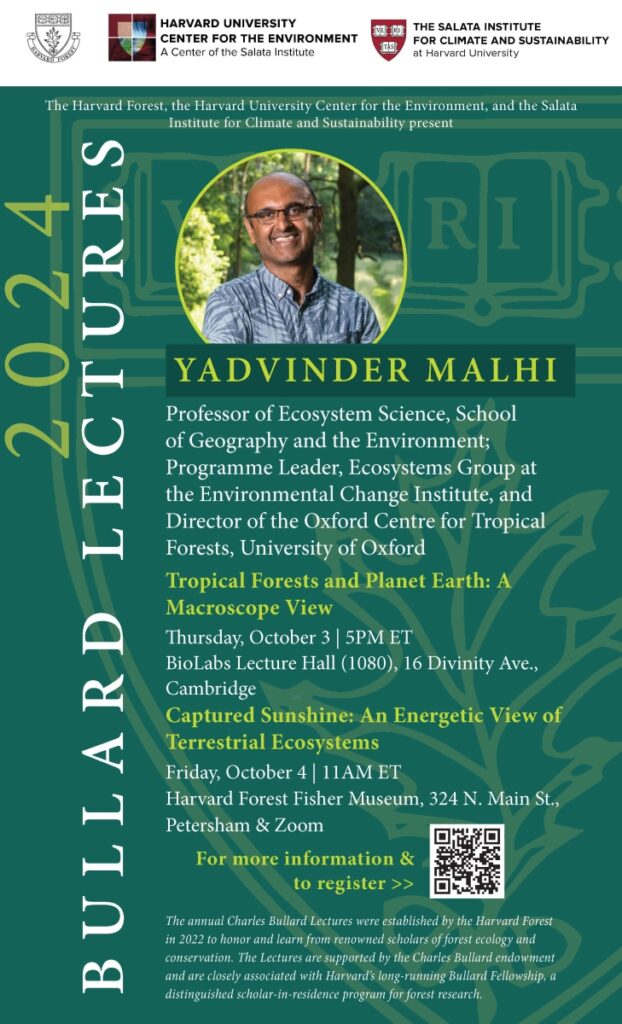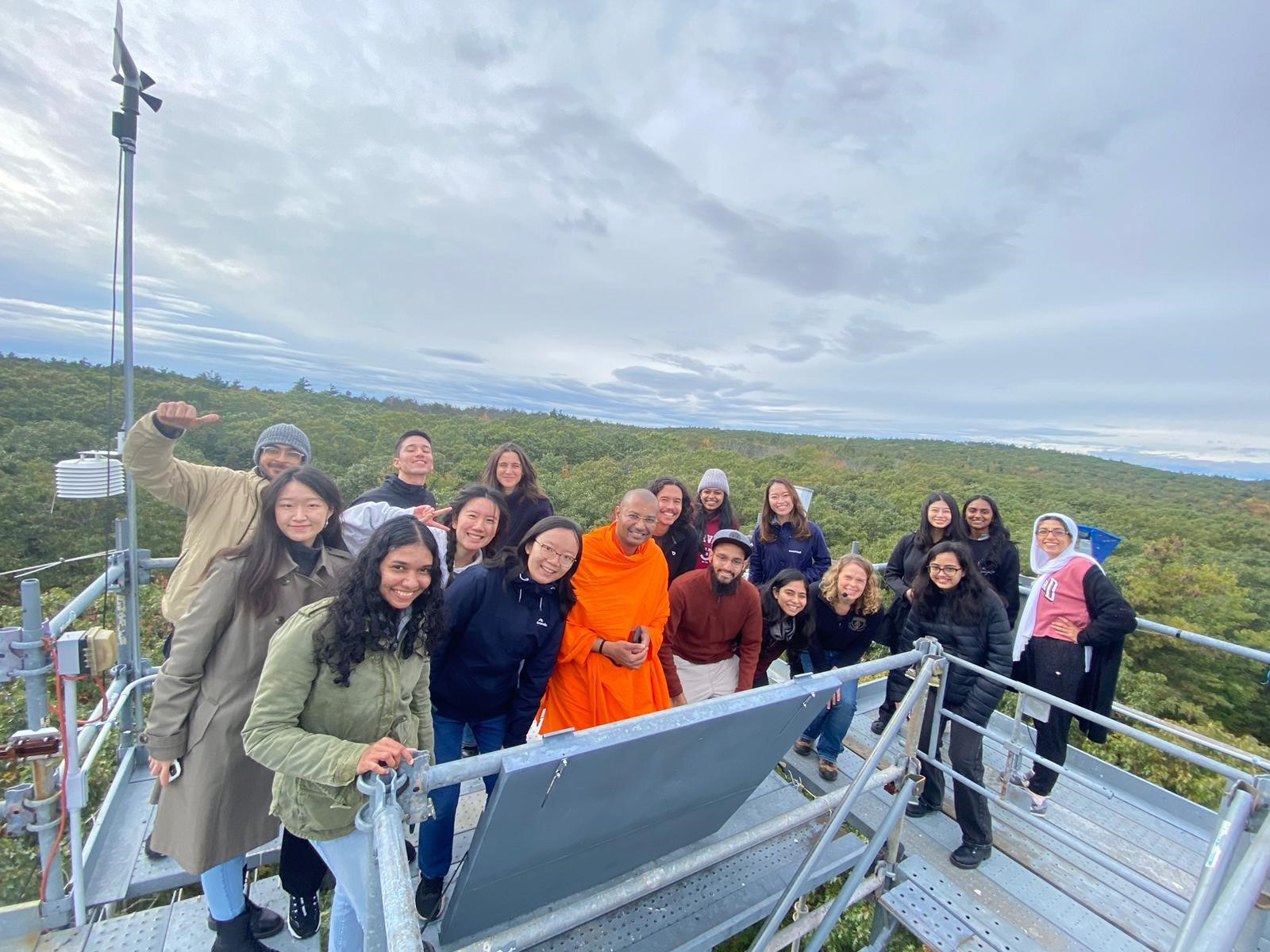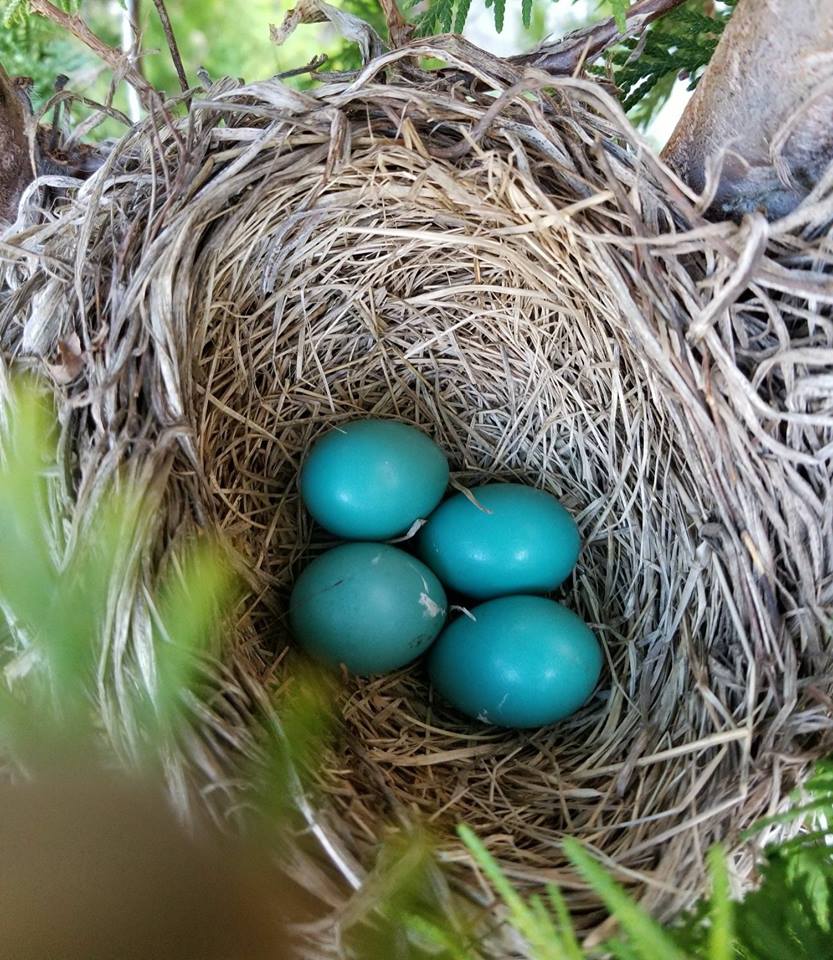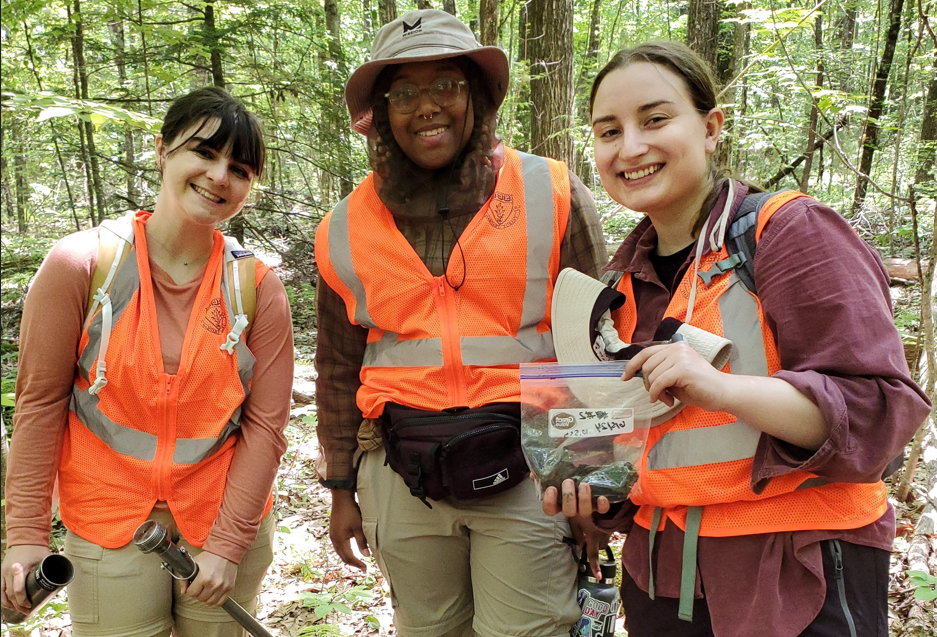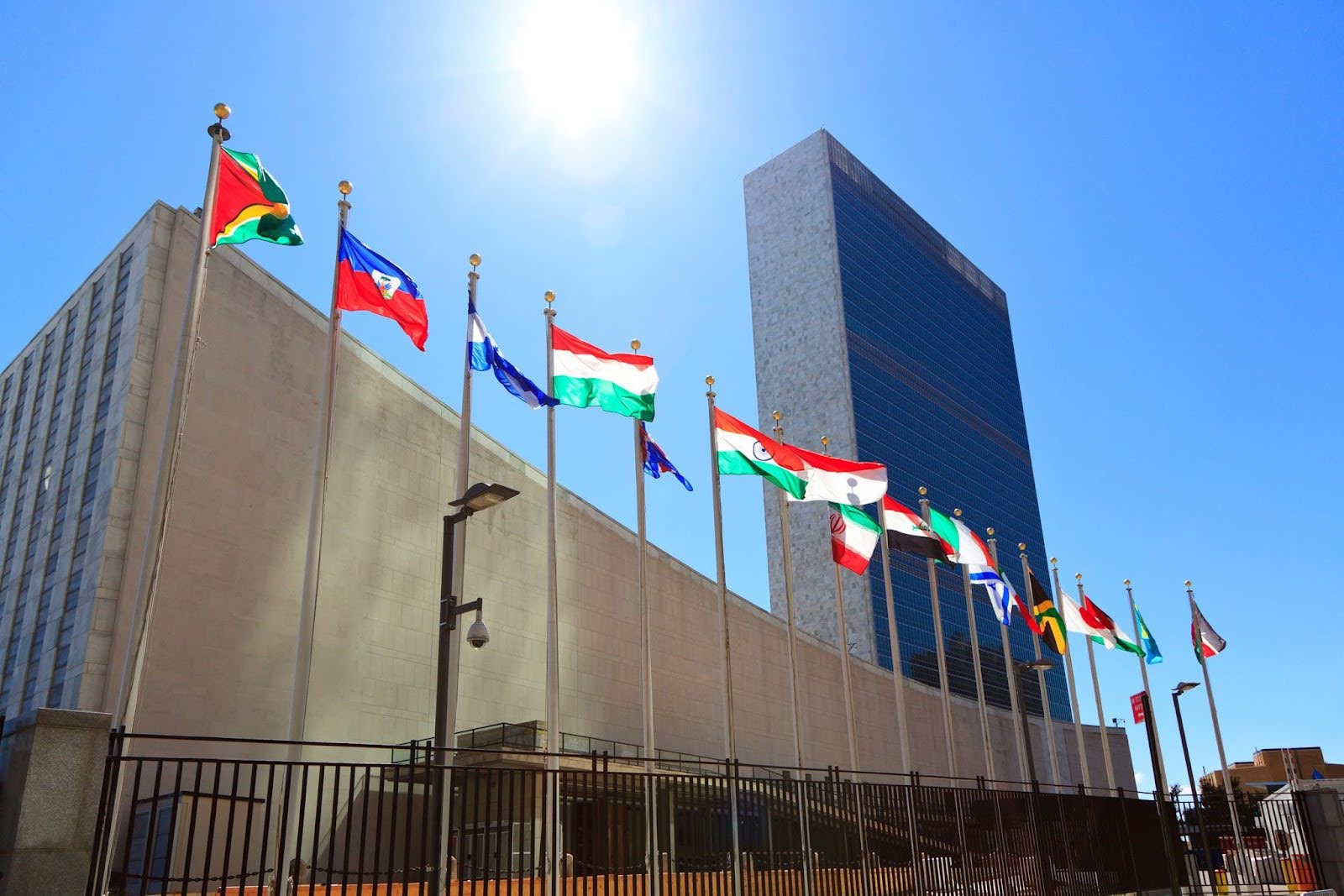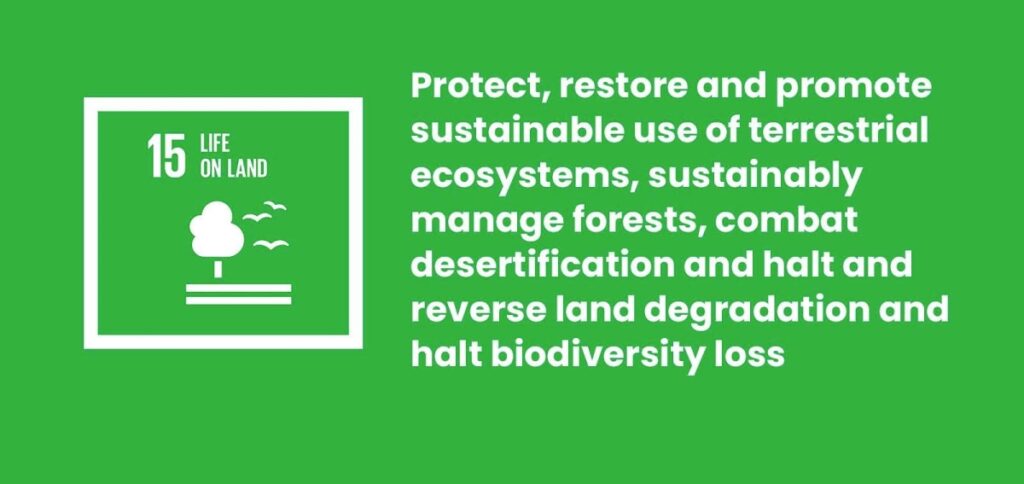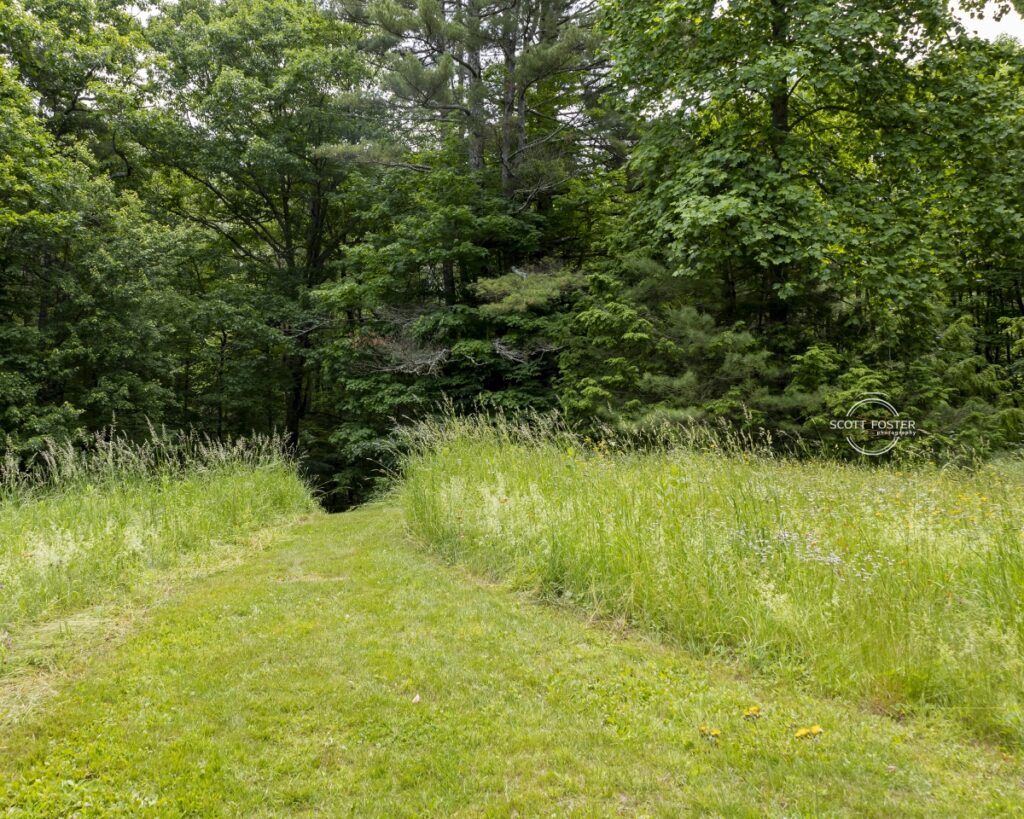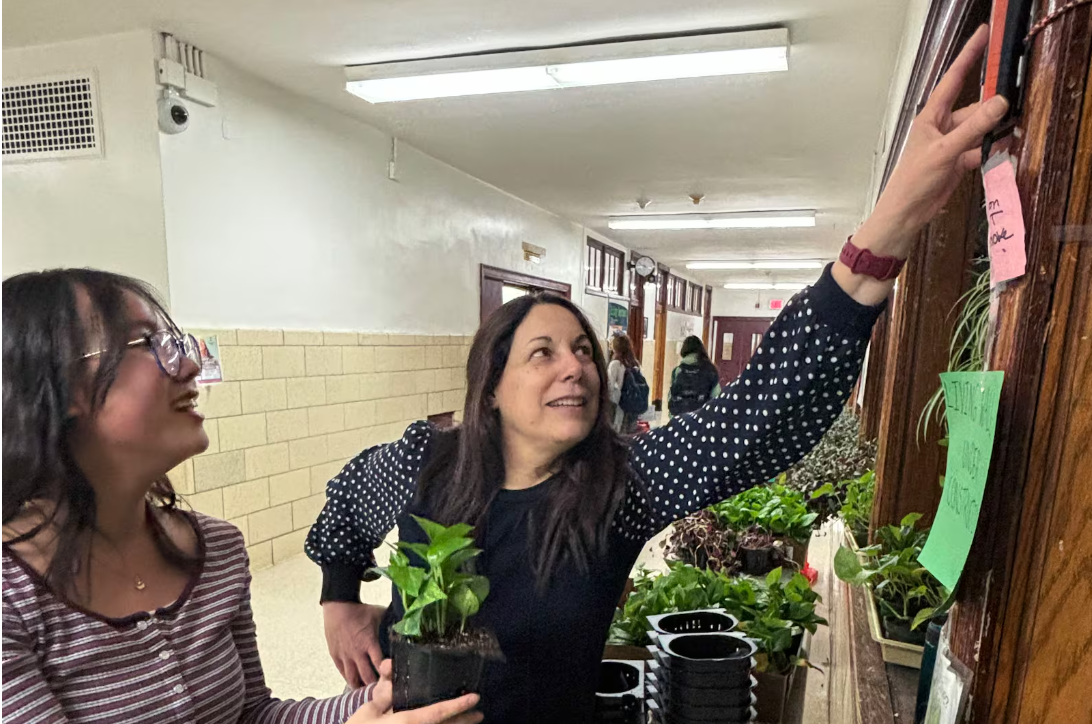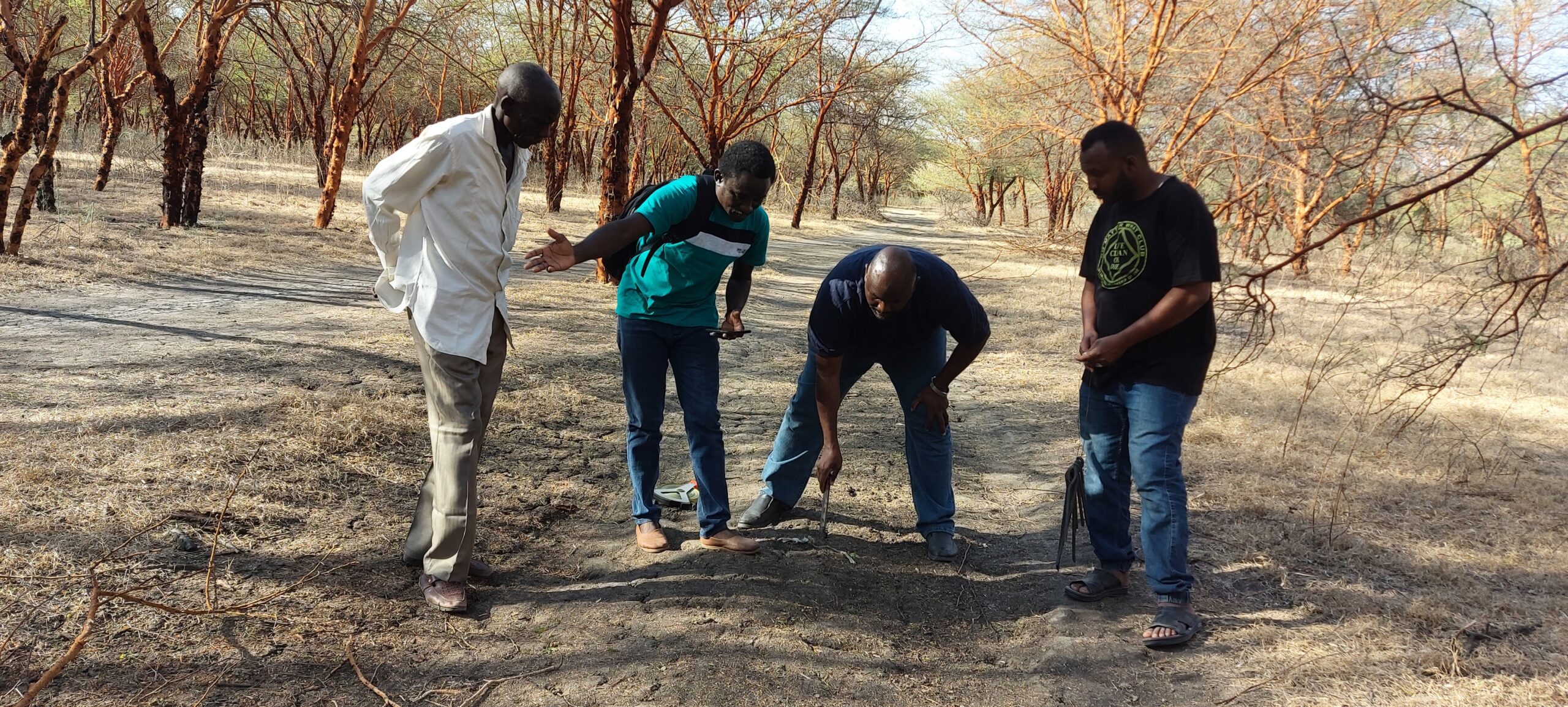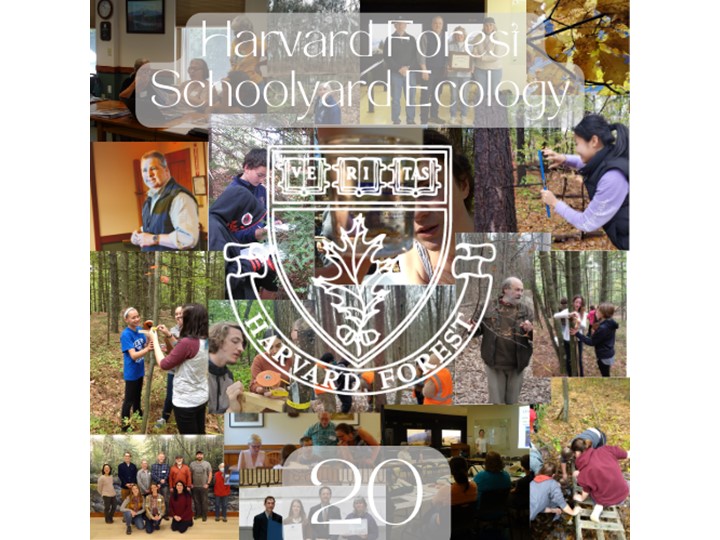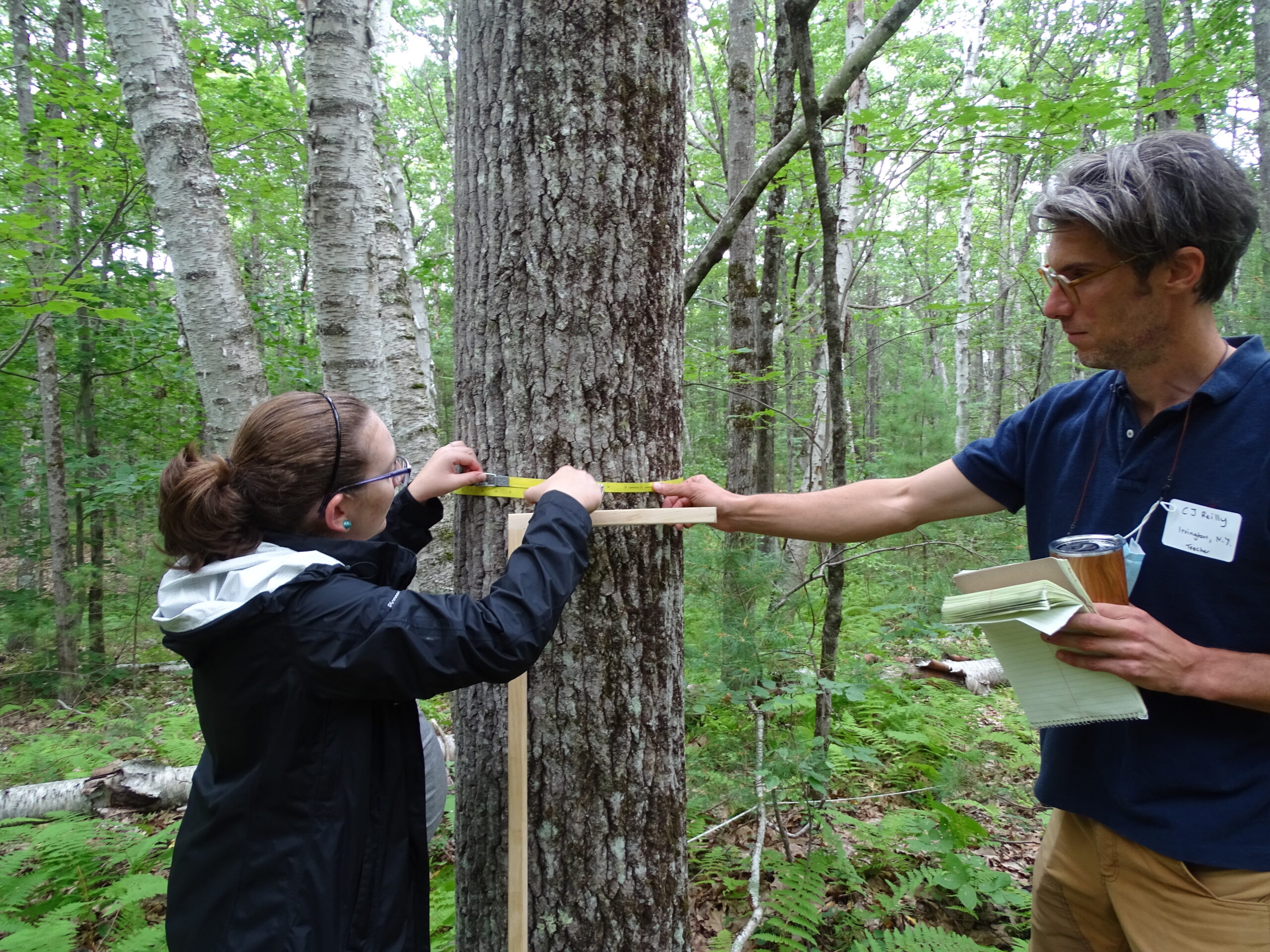NOVEMBER 2024 UPDATE: Applications are now closed.
Harvard Forest Wintersession Internships bring Harvard students (undergraduate and/or graduate) to the Forest in January 2025 for paid, on-site research internships. Interns will work directly with mentors on projects related to Indigenous representation, forest ecology, environmental education, and more (described below). In addition to a paid stipend, room, board, and transportation will be provided to interns at no cost. (See logistics section at the bottom of this page and carefully read each project description.)
Quick links to project descriptions below:
Note to student applicants: Apply directly to the individual project that interests you. See required application materials at the end of each project description. To apply, submit one combined PDF file including all of the requested application materials to the posting in the Crimson Careers portal or directly to Ben Goulet-Scott by the end of the day on Monday, November 4, 2024.
Mentored by Nia Holley, Nipmuc Community Mentor; Tyler White, Harvard Graduate School of Design; Emily Johnson, Harvard Forest Stakeholder Engagement Coordinator; and Clarisse Hart, Harvard Forest Director of Education and Outreach
The Harvard Forest Fisher Museum has been a source of academic understanding of the natural history and landscape change of the Northeast US for generations. The primary 7 historical dioramas in the Museum center a narrative of transformation of the land by European settler-colonists, establishing a seemingly objective history of land management across the region. Excluded from this narrative is the Indigenous history, the perspective of animals and other non-human beings, and the contribution of labor (culturally stewarded, or forced by colonial powers) in shaping the many productive, scientific, and cultural components of the land. A new grant from the federal Institute for Museum and Library Services will support the creation of a new exhibition, Perspectives from Other Beings (explore the funded proposal here), led by Nipmuc community member Nia Holley and Harvard GSD student Tyler White, to disrupt and expand this narrative with a perspective that de-centers the colonial period as the primary pivot point for modern ecosystem function. The intern on this project will conduct research to contribute to a new type of Fisher Museum interpretation (primarily digital) that will begin to reveal the consequential land legacy of Indigenous peoples and uplift the role of Indigenous stewardship on the land today.
The selected student will support the Curatorial Council in three critical areas of the research and engagement strategy for the Perspectives from Other Beings exhibition.
Curatorial Research:
- Historical research understanding the conception, production, and intended use of the Fisher Museum dioramas in the 1930s
- Conducting research (based on traditional ecological knowledges that are shared with free, prior, and informed consent) into the life histories of several more-than-human species in this region
- Collecting examples of contemporary design and art practice by Indigenous (to Turtle Island) land artists and stewards in reclaiming Indigenous histories of land stewardship
- Regional investigation of historical land-settling processes, industries, economies, and cultures over the past several millennia
Engagement Strategy:
- Create a short list of questions for the Curatorial Council’s spring interviews with Indigenous community members and artists for the production of exhibition content
- Work with the Curatorial Council to contact Indigenous community members and artists (by phone, email, and in-person visits) to contribute to exhibition
Successful candidates will possess a combination of the following skills/experiences:
- Experience organizing written and multimedia information into a searchable resource folder
- Experience working as part of a team
- Strong oral and written communication skills
- Experience (or just interest!) in museum exhibition praxis
- Commitment to working respectfully and with an understanding of free, prior, and informed consent on projects related to Indigeneity and Indigenous land
- Experience conducting interviews (in community organizing, journalism, or the social sciences) a plus but not required
- An understanding of Indigenous history and kinships on Turtle Island (particularly the Eastern Woodlands) is preferred
To apply, please submit a combined PDF file to Ben Goulet-Scott by the end of the day on Monday, Nov. 4 that includes:
- A resume that includes your contact info, study concentration, and graduation year, plus a list of 3-5 relevant courses you have taken, and 3-5 relevant jobs or activities you have had
- Contact info for two academic or professional references
- A 250-500-word statement of interest exploring these questions:
- Why do you think this internship would be a valuable opportunity for your growth?
- What about your background would make you a good fit for this position?
- What would success look like for you in this internship?
Mentored by Danelle Laflower, Harvard Forest Research Assistant; Jonathan Thompson, Harvard Forest Senior Ecologist; and Audrey Barker Plotkin, Harvard Forest Senior Ecologist
Forest ecosystems responses to disturbance unfold over decades, but datasets spanning long timescales are rare. We are seeking an intern to collaborate on an analysis of a unique dataset documenting forest change within a network of permanent field plots established in 1960 across the 23,000-hectare Quabbin Watershed in Central Massachusetts, just west of the Harvard Forest. We are interested in quantifying and describing long-term changes in tree demographics, forest structure, and carbon uptake among sites with varying tree species and management history. After 1-2 days of field work to get familiarized with the forests and the sampling design, the intern will assist with data analysis and visualization using the R statistical programming language. There is an opportunity to stay involved with the project and help co-author a peer-reviewed journal article.
Successful candidates will possess a combination of the following skills/experiences:
- Interest in forest ecology, ecological data analysis, and data visualization
- Willing to spend limited time in the forest doing winter fieldwork (Harvard Forest can help to provide wintertime gear for safety and comfort in cold conditions)
- Must have previous experience analyzing and visualizing data, preferably using the R Statistical Software
To apply, please submit a combined PDF file to Ben Goulet-Scott by the end of the day on Monday, Nov. 4 that includes:
- A resume that includes your contact info, study concentration, and graduation year, plus a list of 3-5 relevant courses you have taken, and 3-5 relevant jobs or activities you have had
- Contact info for two academic or professional references
- A 250-500-word statement of interest exploring these questions:
- Why do you think this internship would be valuable for your academic career?
- What about your background would make you a good fit for this position?
Mentored by Katharine Hinkle, Harvard Forest Manager of Youth Education; and Clarisse Hart, Harvard Forest Director of Education and Outreach
During the academic year of 2024-2025 the Schoolyard Ecology team at Harvard Forest is conducting an evaluation on the efficacy of our K12 participatory science program. Over 100 students in our program took a presurvey evaluating their environmental awareness and Science identity. They will take a post survey at the end of the academic year. We are seeking an intern who is interested in qualitative sociological and educational research. Interns will learn the fundamentals of human subject research and gain their CITI certification. They will process survey results and learn analysis skills as well as continuing a literature review for the study.
Successful candidates will possess a combination of the following skills/experiences:
- Interest in education research
- Experience working with spreadsheets
To apply, please submit a combined PDF file to Ben Goulet-Scott by the end of the day on Monday, Nov. 4 that includes:
- A resume that includes your contact info, study concentration, and graduation year, plus a list of 3-5 relevant courses you have taken, and 3-5 relevant jobs or activities you have had
- Contact info for two academic or professional references
- A 250-500-word statement of interest exploring these questions:
- Why do you think that this internship would be a valuable opportunity for your growth as a scientist?
- What do you hope to learn/gain from this experience?
Mentored by Cheryll Holley, Hassanamisco Nipmuc Community Mentor; Jose Ite Santana, Chaubunagungamaug Nipmuck Community Mentor; Emily Johnson, Harvard Forest Stakeholder Engagement Coordinator; and Clarisse Hart, Harvard Forest Director of Education and Outreach
With active citizens across several bands, the Nipmuc are the ancestral stewards of central Massachusetts, including Harvard Forest’s 4,000 acres. Increasingly, land stewardship organizations have granted the Nipmuc and other Indigenous peoples access to land for cultural uses. However, information about these easements or agreements is not centrally located or clearly accessible to all Nipmuc people. This project will effectively collate land access information into educational resources that will increase awareness across the Nipmuc community. Using Google My Maps or a similar program for their final product, the interns will organize and identify missing data, create an interactive map, design printed educational resources such as maps and address lists, and present their findings to Nipmuc leadership.
Successful candidates will possess a combination of the following skills/experiences:
- Experience organizing quantitative and qualitative data into Excel spreadsheets
- Strong oral and written communication skills
- Ability to work independently and problem-solve
- A strong background understanding New England’s Indigenous history is preferred
- Experience working with georeferenced mapping data (e.g., .gpx, .kml) is preferred
- Experience using Google My Maps or a similar program is preferred, but not necessary
To apply, please submit a combined PDF file to Ben Goulet-Scott by the end of the day on Monday, Nov. 4 that includes:
- A resume that includes your contact info, study concentration, and graduation year, plus a list of 3-5 relevant courses you have taken, and 3-5 relevant jobs or activities you have had
- Contact info for two academic or professional references
- A 250-500-word statement of interest exploring these questions:
- Why do you think this internship would be a valuable opportunity for your growth?
- What about your background would make you a good fit for this position?
Mentored by Ann Lewis, Harvard Forest staff and H&LS RP Grant Project Director
A Harvard & the Legacy of Slavery Reparative Partnership Seed Grant for FY 2025, “The Environmental Workforce Development Grant”, helps the grantees (Urban American Outdoors, Inc./SODAS Life, and Ann Lewis) to develop relationships with Boston community organizations to determine which are most capable and interested in working with the grant awardees to design a sustainable environmental workforce development program for implementation in FY 2026. We have organizations with which we are initiating talks, but to be most effective in the long run, we need to know what programs are operating in Boston, what their mandates are, and how they function. The Wintern will complete web-based research and make telephone calls to identify all of the green or environmental workforce development programs that operate with Boston City Limits and their mandates. Ideally, the student may also be able to suggest organizations with which we do not yet communicate, but that we should be considering.
Successful candidates will possess a combination of the following skills/experiences:
- An interest in workforce development and/or social justice
- Ability to think critically and quickly and to be incisive while talking with people in a friendly formal manner
- Ability to summarize web and verbal information quickly in written form
- A good telephone manner
To apply, please submit a combined PDF file to <bgoulet@g.harvard.edu> by the end of the day on Monday, Nov. 4 that includes:
- A resume that includes your contact info, study concentration, and graduation year, plus a list of 3-5 relevant courses you have taken, and 3-5 relevant jobs or activities you have had
- Contact info for two academic or professional references
- A 250-500-word statement of interest exploring these questions:
- Why do you think this internship would be valuable to your short- or long-term life goals?
- What experience(s) do you have that might be useful for working on this project?
- Program dates: Wednesday, January 8, 2025 through Friday, January 24, 2025, with MLK Day off (84 total hours of work)
- Interns will be paid a one-time stipend of $1920 (undergraduates) or $2112 (graduate students) at the conclusion of the internship.
- Interns will live on site at Harvard Forest in Petersham, MA and work full-time (35 hrs/wk).
- Room and board are provided at no cost to the intern. Interns are housed in a small farmhouse dorm on the Harvard Forest campus, with students in single or shared (double and triple) bedrooms and shared common areas.
- Interns will cook their own meals in the dorm kitchen and be driven to the local Market Basket grocery store weekly to obtain groceries (funded by Harvard Forest) for those meals.
- Transportation between Harvard Square and Harvard Forest at the beginning and end of the program is provided cost-free as part of the internship. Students who have their own cars are welcome to bring them (we will reimburse your mileage between Harvard Square and Harvard Forest at the beginning and end of the program).
- Harvard Forest is located in a remote area (Petersham, Massachusetts is a rural town of 1,000 people), 70 miles west of the main Harvard campus. Public transportation is not available here. Interns’ work and free time will be spent here on the quiet Harvard Forest campus, unless they have their own car.
- Harvard University wifi is available throughout campus, including the dorm.
- Interns are given their own desk in a shared office workspace in the main HF building and all necessary supplies.
- Interns can expect daily or near-daily check-ins with their project mentors – but there also will be a strong expectation for independence and self-motivation in the work. The full intern cohort will be offered a weekly guided field trip to explore the local landscape. For your free time, there are many hiking trails at Harvard Forest and we will provide snowshoes for those who would like to use them.
- Harvard Forest has a Code of Conduct that everyone working and living here is expected to follow.
- Harvard Forest is a department of Harvard University, so all relevant university policies, including COVID protocols, are in place here.
- The Harvard Forest welcomes individuals with disabilities to participate in its programs. If you anticipate needing any type of accommodation for the application process or have questions about the physical access and resources provided on-site, please contact us at hfvisit@fas.harvard.edu.
To Apply
See required application materials at the bottom of each project description, above. All applications are due to the posting in the Crimson Careers portal or directly to Ben Goulet-Scott by the end of the day on November 4, 2024. Please note: Applications are now closed.
Read highlights about the work of our January 2024 interns, January 2023 interns, and January 2022 interns.
